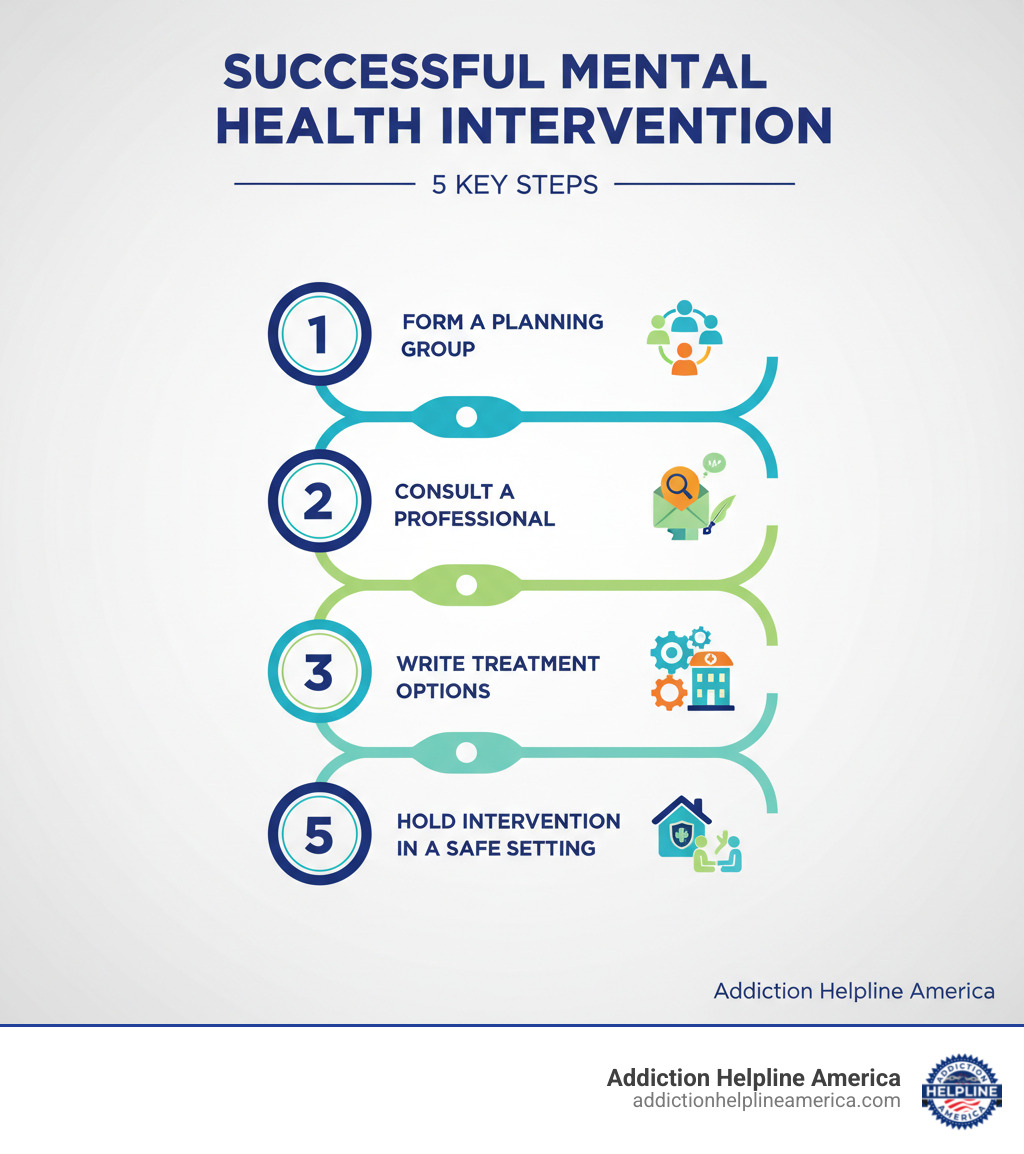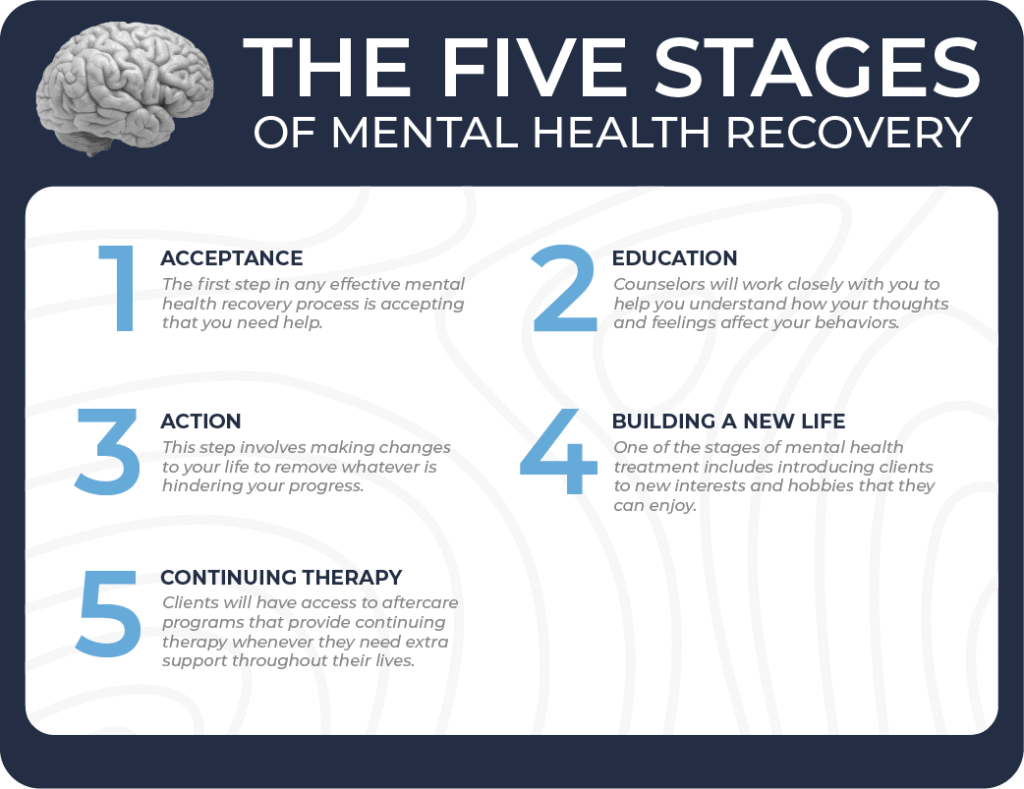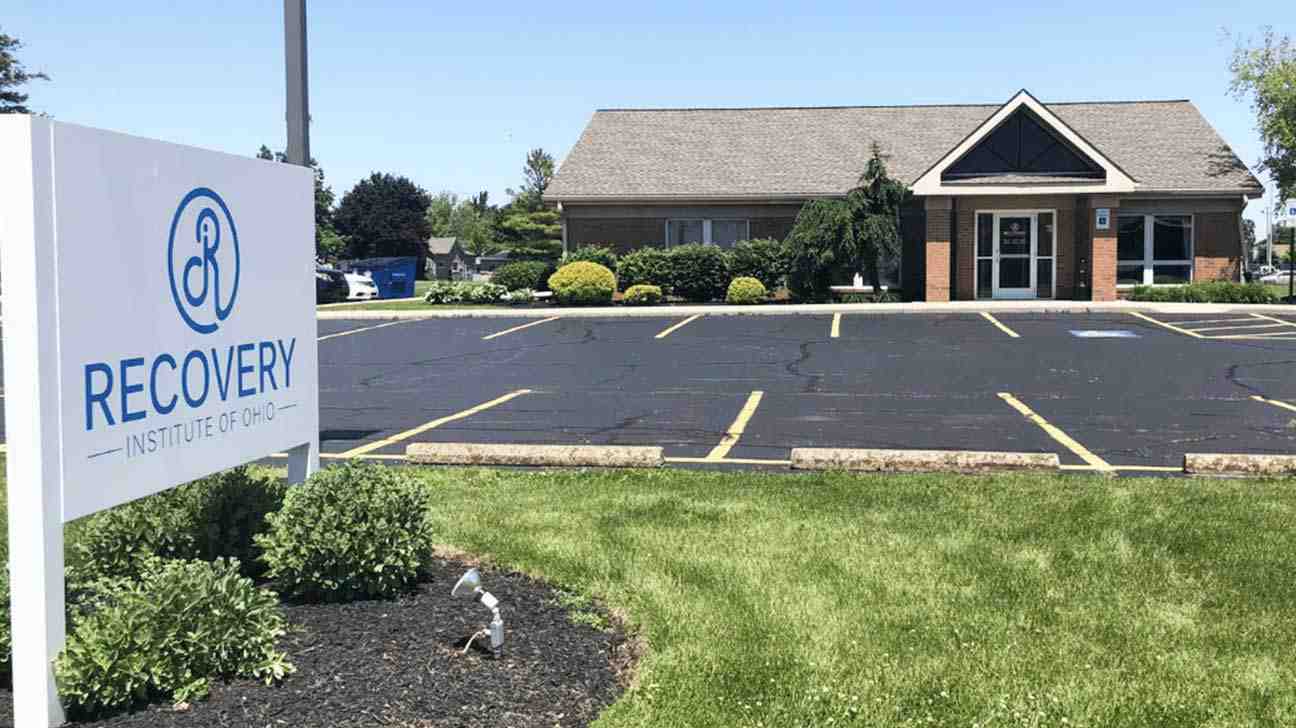
Understanding the Power of Compassionate Support in Crisis
A mental health intervention is a structured meeting where loved ones encourage someone struggling with mental illness or substance abuse to seek professional treatment. It’s a planned, supportive conversation—not an attack—focused on expressing love and concern with the goal of getting the person into treatment.
An intervention is appropriate when someone denies their problem, refuses help, poses a risk to themselves or others, or when their condition is worsening despite private conversations. While millions struggle with mental health conditions, many don’t receive care. But interventions work, and thousands enter recovery each year because of them.
The key is creating an environment of safety. As one intervention specialist explains, someone in crisis is filled with fear and anger, but they have “no defense against love.” This loving approach is the great power of an intervention.
At Addiction Helpline America, we guide families through this process, connecting them with professional interventionists and evidence-based treatment programs. Our 24/7 helpline provides the immediate, confidential support you need to help your loved one find the path to recovery.

Easy Mental health intervention glossary:
Understanding Mental Health Intervention: What It Is and When It’s Needed

Watching someone you love struggle is heartbreaking. When private conversations fail to break through denial or fear, a mental health intervention becomes a necessary next step. It’s a structured meeting where loved ones gather to help someone recognize they need professional treatment and guide them toward it.
The World Health Organization emphasizes that effective psychosocial interventions can dramatically improve well-being. An intervention creates a bridge from crisis to care, especially when someone is at risk or dealing with co-occurring disorders.
Many wonder, Can I Refuse Mental Health Treatment? The answer is usually yes, which is why interventions are so valuable. They don’t force treatment but create a moment of clarity where the person can choose help, seeing how their struggle affects those who love them.
What is a mental health intervention?
A mental health intervention is a formal, planned meeting where loved ones express their love and concern to motivate someone to accept professional help. It’s not an ambush but a safe environment designed to soften defenses and open the door to recovery. The goal is to help the person acknowledge the problem and agree to a pre-arranged treatment plan.
When is an intervention appropriate?
Certain warning signs indicate it’s time to take this step:
- Risk to self or others: This is the most urgent indicator. If your loved one is suicidal, self-harming, or acting recklessly, immediate action is critical. The 988 Suicide and Crisis Lifeline provides 24/7 support.
- Severe decline in functioning: When someone can no longer work, maintain hygiene, or handle daily responsibilities, family support alone is not enough.
- Co-occurring substance abuse: When mental health issues and addiction feed off each other, a comprehensive intervention can address both problems.
- Refusal to acknowledge the problem: If your loved one consistently minimizes their symptoms or becomes defensive, a unified message from an intervention can be powerful.
- When other attempts have failed: After one-on-one talks and reasoning have not worked, a structured intervention with professional guidance may be the catalyst for change.
Types of Interventions and the Role of a Professional
When deciding to stage a mental health intervention, choosing the right approach and involving a professional can make all the difference. An intervention requires specialized expertise, and proven models provide the structure needed for success. Our Find a Rehab Ultimate Guide can help you explore treatment options to have ready.
Why Hire a Professional Interventionist?
A professional interventionist is a trained specialist who guides you through the complex process. Their involvement significantly increases the success rate by:
- Providing Expert Guidance: They help plan every detail, using their experience to create an effective roadmap.
- Acting as a Neutral Facilitator: They keep the meeting from becoming a blame session, ensuring the focus remains on treatment.
- De-escalating Conflict: They know how to redirect anger and fear into an openness to receiving help.
- Managing Unexpected Reactions: They are prepared for denial or negotiation and have strategies to keep the process on track.
- Ensuring a United Front: They help the family agree on a plan, presenting a powerful, unified message of love and concern.
As one expert notes, a professional creates “an environment of safety” where the person struggling “has no defense against love.” For a deeper look, visit our page on the role of a professional interventionist.
Call Now – Your Journey to Recovery Begins Today!

Take the first step towards a healthier life! Call now to connect with our compassionate team and start your recovery journey today. Your path to healing awaits!
Our recovery specialists are available 24/7 to provide support, and all calls are confidential and free. Reach out anytime – we’re here to help!
Common Intervention Models
Different approaches work for different families. A professional can help you choose the best fit.
| Intervention Model | Approach | Key Characteristics |
|---|---|---|
| Johnson Model | Confrontational | Uses an ultimatum to explain the dangers and consequences of declining treatment. Direct and effective for getting people into care. |
| ARISE Model | Invitational | A non-surprise, transparent process where the affected person is involved in planning. Calming, patient, and less stressful. |
| Love First Model | Spiritual Guidance | Leverages family love and spiritual connection as the primary tools for motivating someone to seek treatment. |
| Family Systemic Model | Holistic | Examines how family dynamics and environment contribute to the issue without blame, aiming to heal the entire system. |
Other approaches include psychoeducational interventions, which focus on educating the family and individual about the condition. An interventionist can help you select or combine models to create the most effective plan for your loved one.
How to Stage a Successful Intervention: A Step-by-Step Guide

Planning a successful mental health intervention is a deliberate process that can save a life. As Board Registered Interventionist Dr. Jerry L. Law states, “Thousands of once ‘hopeless cases’ enter into treatment and recovery every year.” Success comes from careful planning, and our First Steps to Recovery guide can help you begin. A key principle is that Participants should have a caring relationship with your loved one—the group should consist only of trusted family and friends.
Key Steps and Best Practices
The planning phase is where you set the stage for success.
- Form your planning group: Gather a small circle of people who truly care and are committed to helping.
- Consult a professional interventionist: This is your most important step. A professional guides you through the process, ensuring a structured, loving conversation.
- Choose the right time and place: Select a private, neutral location and ensure you’re ready to go to treatment immediately if they agree.
- Write impact letters: Each person writes a letter with specific examples of how the behavior has affected them, expressing love and concern, not blame. Practice reading it aloud.
- Prepare for specific outcomes: Plan for both a ‘yes’ and a ‘no.’ Work with your interventionist to set clear boundaries if treatment is refused.
- Arrange treatment in advance: This is critical. Before the meeting, have a treatment program selected, insurance verified with resources like our Verify Rehab Insurance Complete Guide, and all logistics arranged.
What to Expect During the Meeting
Even with perfect planning, interventions are emotional. Expect a range of reactions:
- Emotional Responses: Your loved one may show tears, sadness, or remorse, which can be signs of a breakthrough.
- Anger and Denial: These are common reactions fueled by fear. They may lash out or insist you’re exaggerating.
- Defensiveness and Negotiation: Expect justifications for their behavior or attempts to negotiate a less immediate solution, like promising to quit on their own.
Despite resistance, the power of love and unity often breaks through. When someone sees everyone they care about expressing genuine concern, walls can crumble. An interventionist helps you stick to the plan, redirecting arguments and keeping the focus on the core message: “We love you, we’re concerned, and we have a way to help you heal.” Don’t take hurtful words personally; they are often a symptom of the illness.
Navigating Challenges and Supporting Long-Term Recovery

A mental health intervention is the first step on the road to recovery. What happens after is just as important. Research on the Efficacy of psychosocial interventions shows that continued support significantly improves outcomes, which is why we emphasize the role of Family Support Addiction throughout the journey.
Potential Challenges and Risks
Be prepared for potential challenges. The emotional intensity can be overwhelming, and your loved one may feel ambushed, triggering anger or resentment. Without professional guidance, there’s a risk of damaged relationships if the person feels attacked.
The most difficult outcome is the refusal of help. Even with perfect planning, your loved one may say no. This isn’t a failure, but it means you must be ready to implement the boundaries you planned. In rare cases of severe risk, legal considerations like involuntary commitment may be necessary. These risks underscore why a professional is vital to keep the focus on love and support.
Call Now – Your Journey to Recovery Begins Today!

Take the first step towards a healthier life! Call now to connect with our compassionate team and start your recovery journey today. Your path to healing awaits!
Our recovery specialists are available 24/7 to provide support, and all calls are confidential and free. Reach out anytime – we’re here to help!
Providing Ongoing Support After the Intervention
When your loved one says yes to treatment, your support is more important than ever. Recovery is a long-term process.
- Participate in Family Therapy: Many treatment programs offer family sessions. Your involvement helps heal relationships and improves communication.
- Maintain Accountability and Follow-up: Show you’re invested with consistent, loving contact. This reinforces that they are not alone in their fight.
- Encourage a Broader Community: Help your loved one Build a Support Network through support groups, sponsors, and sober friends.
- Celebrate Milestones: Acknowledge and celebrate progress, no matter how small. Positive reinforcement is a powerful motivator.
Recovery is a marathon. Your continued patience and support after the intervention can mean the difference between relapse and lasting change.
Reducing Stigma and Finding Help
Millions of people suffer from mental health conditions in silence, often held back by stigma and fear. When we normalize seeking help, we create space for healing. A mental health intervention can be a turning point, but it’s most effective when the person knows they are moving toward support, not judgment. Asking for help is an act of courage.
The Importance of Early Mental Health Intervention
Addressing mental health concerns early changes the entire trajectory of someone’s life. Early intervention leads to better outcomes, prevents complications like substance abuse and job loss, and protects long-term wellness. Normalizing mental health screenings and encouraging open dialogue are key to catching concerns before they become crises.
Finding the Right Mental Health Intervention and Support Resources
Knowing where to turn can be overwhelming. Addiction Helpline America offers free, confidential guidance to connect you with the right treatment program nationwide.
- For Immediate Crisis: If someone is in danger, call the 988 Suicide and Crisis Lifeline for 24/7 support.
- Local Resources: Many states offer mobile crisis services. We can help you find resources in your area, from Alabama’s Department of Mental Health to Arizona’s crisis intervention services.
- Treatment Programs: Our Addiction and Rehab Hotlines guide helps you find a program that fits your loved one’s needs.
- Support Groups: Peer support from groups like Narcotics Anonymous provides an irreplaceable connection.
- Insurance Coverage: We can help you verify rehab insurance coverage. All state Medicaid programs cover behavioral health services, and Medicare also provides coverage.
Our 24/7 helpline is here to help you steer this journey. You are not alone.
Frequently Asked Questions about Mental Health Interventions
What if my loved one refuses help during the intervention?
Refusal happens, but it doesn’t mean failure. A professional interventionist will have prepared you for this. The next step is to maintain communication while setting firm, loving boundaries around enabling behaviors. The seeds planted during the intervention may take time to grow; many who initially refuse eventually seek help. Stay prepared by continuing to research treatment options. Addiction Helpline America can support you during this waiting period.
Do interventions actually work?
Yes. As Dr. Jerry L. Law states, “Thousands of once ‘hopeless cases’ enter into treatment and recovery every year.” Mental health interventions work by creating a united front of love that is difficult to ignore. While not every intervention leads to immediate acceptance, a professionally guided process dramatically increases the odds of success by creating a structured, loving environment where change becomes possible.
Can an intervention make the situation worse?
An improperly handled intervention can make things worse by making the person feel attacked, causing them to withdraw further. This is why working with a professional interventionist is so critical. They prevent the meeting from becoming a shouting match and ensure the focus stays on love, concern, and a path to recovery. With expert guidance, an intervention is far more likely to open a door to healing than to close one. We can connect you with experienced professionals to ensure the process is handled with compassion and skill.
Call Now – Your Journey to Recovery Begins Today!

Take the first step towards a healthier life! Call now to connect with our compassionate team and start your recovery journey today. Your path to healing awaits!
Our recovery specialists are available 24/7 to provide support, and all calls are confidential and free. Reach out anytime – we’re here to help!
Conclusion

Worrying about a loved one struggling with mental illness or substance abuse is a heavy burden. Reaching out for help is an act of profound love, not a sign of giving up.
A mental health intervention is a bridge from crisis to healing, built on planning, professional guidance, and unwavering love. The key takeaways are clear: planning matters, love is your greatest tool, and professional guidance is essential for success. A well-organized intervention, delivered with compassion and steered by an expert, can break through denial and open the door to recovery.
The journey continues after the intervention with ongoing support and accountability. At Addiction Helpline America, we’ve helped thousands of families steer this path. We offer free, confidential guidance to connect you with the right treatment programs nationwide. You don’t have to do this alone.
Hope is a decision to take action. If you’re ready, Learn how to get addiction help for a loved one and let us walk beside you toward recovery. Your loved one’s sunrise is waiting.
Our helpline is 100%
free & confidential
If you or someone you care about is struggling with drug or alcohol addiction, we can help you explore your recovery options. Don’t face this challenge alone—seek support from us.
Programs
Resources
Will my insurance
cover addiction
treatment?
We're ready to help
Find the best
drug or alcohol treatment
center
Are you or a loved one struggling with addiction? Call today to speak to a treatment expert.















